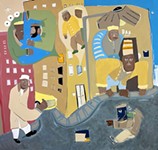Himalaya
1999, NR, 104 min. Directed by Eric Valli. Starring Karma Tensing, Gurgon Kyap, Lhapka Tsamchoe, Karma Wangiel, Thilen Lhondup, Nyima Lama.
REVIEWED By Kimberley Jones, Fri., June 22, 2001
Filmed by a French crew, but acted by mostly nonprofessional locals (and subtitled in English), Himalaya was the first-ever Nepalese entry for an Academy Award for Best Foreign Film. (It lost to that magnificent juggernaut, Crouching Tiger, Hidden Dragon.) The film begins with the maybe-suspicious death of a Dolpopa chief. In his place someone must lead the yearly caravan across the Himalayas -- an excruciating, weeks-long trek into town in order to trade the village's salt for a food supply that will last through year's end. The community quickly divides over who will take the reins: the slain leader's graying father, Tinlé (Lhondup), a retired chief himself, or the hale, headstrong Karma (Kyap), who eschews ancient practices for modern ways (and may have had a hand in the previous chief's death). In the end, two separate expeditions set off for the mountains. It's the tortoise and the hare, Nepalese-style, and it's surprisingly dramatic. The Himalayan journeys take up the bulk of the film, and though the scenes are necessarily repetitive -- shot after shot of the caravans trudging up hills, trudging through snow, trudging along cliffsides -- they still manage to thrill. That success can be attributed at least in part to joint cinematographers, Eric Guichard and Jean-Paul Meurisse, who together won a César for their work. Their camera succeeds in capturing the splendor and the terror of the mountains, the hugeness of it all. I imagine it'd be difficult to muck up the Himalayas (no doubt the mountains film impressively even in poor lighting or in jerky hands). But in lensing the Dolpo people, they exhibit a devastating intimacy with their close-ups of the weather-beaten, beat-down caravan of travelers. And, despite the remoteness of these people (and their tradition is quickly going the way of obsolescence, even in Nepal), the story feels accessible, familiar. Sometimes a little too familiar – Himalaya's story arc is so conventional, you can spot each shift easily 10 minutes prior, which can make the film's pacing drag something awful. But what subtlety the script lacks, the cast of actors makes up for in spades. Lhondup and Kyap are superb as the two men – one old and craggy, the other young and cocky – who engage in an ideological war across a mountaintop. Both are so complex and appealing, I found myself wishing the tortoise and the hare could have just called it a draw and sent everyone home happy.
A note to readers: Bold and uncensored, The Austin Chronicle has been Austin’s independent news source for over 40 years, expressing the community’s political and environmental concerns and supporting its active cultural scene. Now more than ever, we need your support to continue supplying Austin with independent, free press. If real news is important to you, please consider making a donation of $5, $10 or whatever you can afford, to help keep our journalism on stands.
May 17, 2024
Himalaya, Eric Valli, Karma Tensing, Gurgon Kyap, Lhapka Tsamchoe, Karma Wangiel, Thilen Lhondup, Nyima Lama







